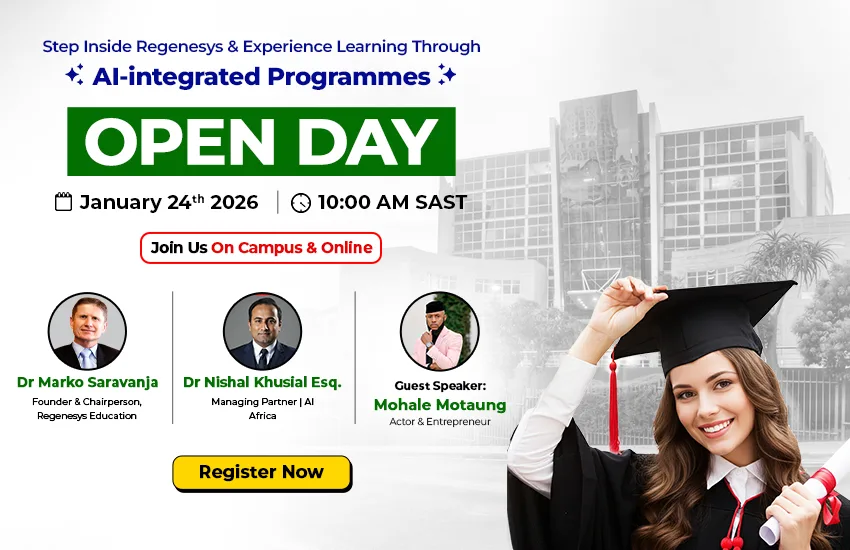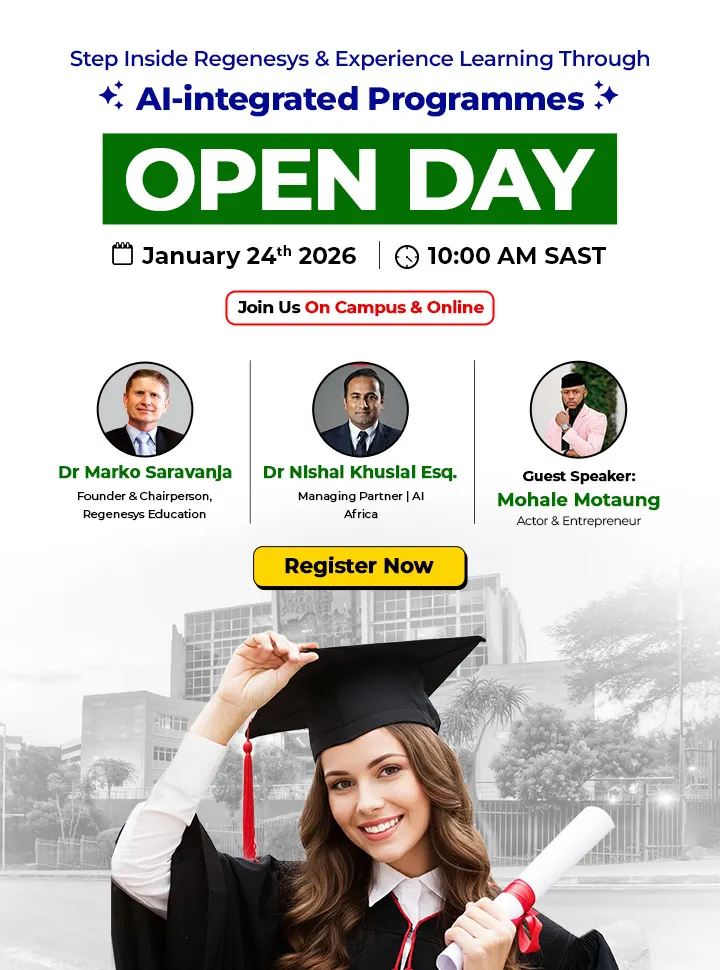South Africa’s economy may be moving fast, but one truth stood out in Dr Rajesh Sharma’s masterclass: leadership still determines whether organisations advance or stall. He showed why the MBA remains the country’s most dependable springboard into leadership and long-term career growth. Technologies change and roles are rewritten, yet the need for people who set direction, unite teams and make well-judged calls only increases.
What “futureproof” really means

Futureproof does not mean predicting every new technology. It means developing portable capabilities that hold their value across roles, sectors and geographies. As Dr Sharma framed it, a rigorous MBA at NQF Level 9 strengthens decision-making under uncertainty, systems thinking that connects finance, operations, people and technology, financial literacy that anchors judgement, customer insight that links ideas to demand, and people leadership that sustains performance when stakes are high. These capabilities compound over a career and travel well, whether a graduate stays in South Africa or leads across borders.
The session surfaced familiar disruptors to make a deeper point. Uber, Netflix and Airbnb did not just apply technology, they rewired how value is created and captured. When an industry shifts like this, the heaviest work is leadership work: framing the problem clearly, choosing the metrics that matter, navigating regulation, managing risk and keeping customers at the centre. Regenesys teaches innovation as disciplined learning rather than theatre, so experimentation turns into repeatable results and governance grows alongside creativity.
What Makes Regenesys’ MBA different

A distinctive feature that Dr Sharma highlighted was Personal Mastery, a dedicated module he noted is not offered by other MBAs in the country. It is designed to grow the whole leader by developing four complementary intelligences in depth:
- EQ (emotional intelligence): builds self-awareness, self-regulation, empathy and social acuity so our students can hold difficult conversations, coach for performance, negotiate fairly and influence without formal authority.
- SQ (spiritual intelligence): the capacity to connect with purpose, meaning and values beyond the self, enabling our students to lead with perspective, courage and humility under pressure. It is treated as a trainable intelligence through guided reflection and values-to-behaviour practice.
- PQ (physical intelligence): equips our students to understand and manage their physiology for sustained performance, including sleep, movement, nutrition, focus and recovery, so energy and attention are available when it matters most.
- FQ (financial intelligence): sharpens fluency in unit economics, financial statements, risk pricing, capital allocation and scenario modelling, ensuring strategic choices are grounded in cash flow and value creation.
Personal Mastery also turns intention into action. Students set practical financial and physical goals, then learn the habits and accountability routines that make those goals real. The result is a leader who is centred, ethically grounded and commercially sharp.
Leaders are made, not born

The masterclass challenged the myth of the “natural leader”. Leadership is a craft built through deliberate practice. In the MBA environment, participants interrogate assumptions, synthesise data into clear points of view and defend recommendations with numbers and narrative. They learn to move between balcony and dance floor, zooming out to read the system then zooming in to remove the bottleneck. These habits are the best insurance against becoming obsolete.
South Africa’s realities make these capabilities even more valuable. Leaders must navigate volatility, resource constraints and ambitious transformation agendas. When organisations enter a new province or a neighbouring market, project teams form quickly, and credibility must be earned immediately. Qualifications matter in these moments. An MBA signals readiness to take ownership and the breadth to integrate finance, operations, technology and people decisions into a coherent plan. It does not replace performance, but it earns a seat at the table where performance is noticed.
A powerful insight from the session was how an MBA multiplies existing qualifications rather than sitting beside them. Engineers become product leaders who translate technical judgement into commercial outcomes. Accountants move from compliance to growth by pricing risk, modelling scenarios and communicating strategy. Health professionals lead service redesign by marrying clinical insight with operations and stakeholder management. Creatives become brand builders who connect craft to cash flow. The degree functions as a translation layer that unlocks senior responsibility.
Automation raises, not replaces, leadership

Artificial intelligence and automation will reshape roles, but they raise the premium on judgement, ethics, prioritisation and coordination. When systems generate several plausible options, someone must choose the one that fits the strategy, the brand and the regulatory context. When data points in two directions, someone must decide which risk to carry and how to communicate that choice. These are leadership decisions. They are not outsourced to code. The MBA exists to prepare people for precisely this work.
Practice, community and global relevance

Regenesys emphasises case-based and scenario-based learning across strategy, innovation and functional disciplines. Students practise aligning enterprise strategy with finance, marketing, HR, IT and operations, then test their thinking through debate and real-world application. The programme’s network is a force multiplier, opening doors in corporate, entrepreneurial and public-sector pathways. With global faculty experience and cross-cultural classrooms, graduates are prepared to lead in diverse environments and to collaborate across borders.
Whether standing up a new business unit, entering a new geography or steering transformation inside a legacy organisation, the constant is leadership. It can be learned, and it improves with practice. An MBA that couples rigorous management training with Personal Mastery is the most concentrated way to build the breadth, judgement and confidence to lead through change.
Hosted by Dr Rajesh Sharma. Watch the masterclass recording here.







